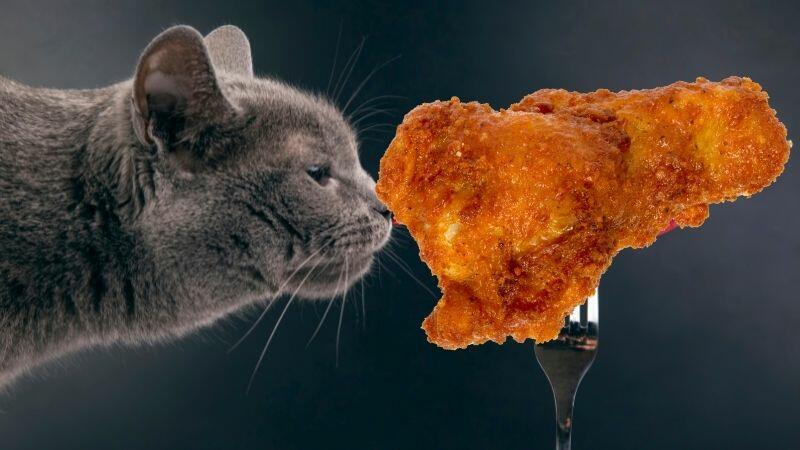Cats are famously curious creatures, often sticking their noses where they don’t belong. So what happens if your cat sneaks a bite of your spicy chicken wings when you’re not looking? The short answer is no – cats should not eat spicy chicken wings.
While a lick or small taste likely won’t harm them, spicy seasonings and spices can irritate cats’ sensitive digestive systems and mouths. At best, your cat may get a runny nose or upset tummy. At worst, spicy wings could cause severe vomiting, diarrhea, appetite loss, and dehydration.
This article will cover why it’s best to keep spicy chicken wings away from your cat and what to do if they sneak a taste. You’ll learn:
- How spicy seasonings and toxic spices affect cats
- What symptoms to watch for if your cat eats spicy wings
- Steps to take if your cat gets into spicy wings
- Tips to keep curious cats away from dangerous foods
While we humans may love spicy chicken wings, they are too hot for our feline friends to handle. With some care and prevention, you can safely enjoy these zesty treats without putting your cat at risk. Read on to learn more!
Why Cats Should Avoid Spicy Chicken Wings
Cats are obligate carnivores, meaning they need meat in their diet. But that doesn’t mean they can eat just anything! Here’s why cats should steer clear of spicy chicken wings:
Capsaicin Causes Irritation
The chemical that makes hot peppers spicy is called capsaicin. It binds to pain receptors, causing irritation and inflammation. This can bother a cat’s throat and mouth.
Spices Upset Digestion
Spicy seasonings like cayenne or chili powder can upset a cat’s sensitive stomach. Eating spicy chicken wings may cause:
- Nausea
- Loss of appetite
- Diarrhea
- Vomiting
- Dehydration
Toxic Spices
Some spices in chicken wings are toxic to cats, like garlic, onion, nutmeg, cinnamon, cloves, and allspice. Even small amounts can cause illness.
Higher Temperature
Warm chicken wings smell enticing. But the high temperature makes cats gulp food down faster, leading to upset stomach.
Why Does My Cat Like Spicy Wings?
As an obligate carnivore, your cat is driven by instincts to hunt and eat meat. So when they smell tasty chicken, curiosity kicks in! Here are a few reasons your cat may try to steal spicy wings:
Smell – A cat’s sense of smell is 14 times better than a human’s. The enticing aromas of chicken skin, crispiness, spices and seasonings allure them, even if the wings are too hot for their tastes.
Texture – Cats love to crunch and chew. The crispy coating and juicy meat of wings appeal to their preferences for texture.
Temperature – Cats prefer warm food since it mimics fresh prey. The high temperature of hot wings right off the grill is very tempting.
Fat Content – Wings have a high fat content that cats crave due to their need for protein and calories.
Novelty – The new smells and flavors of spicy seasonings intrigue curious kitties even if the spices don’t match their taste preferences.
Instincts – When cats see you enjoying meat, it triggers their natural drive to hunt, eat, and share a meal.
While spicy wings may seem irresistible at first, most cats will learn after a bite or two that they don’t align with their tastes. Use caution and monitor your cat any time meaty human foods are around to be safe. With some diligence, you can satisfy your cat’s curiosity while also protecting their health.
What Happens if a Cat Eats Spicy Wings?
Should you worry if your cat steals a spicy wing? Here’s what to expect:
- A lick or bite – Your cat likely gets a runny nose or teary eyes. They’ll probably walk away disinterested.
- Several bites – You may see digestive upset like vomiting or diarrhea. Loss of appetite and lethargy are possible.
- Large amount – Severe vomiting, diarrhea, mouth pain, and dehydration may occur. Seek veterinary care immediately.
Can Cats Eat Chicken Bones?
Chicken wings contain small bones that raise concerns for cat owners. So, can cats eat chicken bones safely?
The answer is no – cats should not eat chicken bones. While cats are meat-eaters, their bodies are not equipped to digest bones.
Chicken bones can pose the following risks to cats:
- Choking Hazard – Bones can lodge in the throat, mouth, or esophagus, blocking airways. This can lead to choking or breathing difficulties.
- Internal Injury – Swallowed bones can puncture or perforate the stomach, intestines, or throat. Sharp edges also increase this risk.
- Blockages – Bones can clump together in the digestive tract, causing a blockage that prevents eating, vomiting, or defecating.
- Constipation – Bone fragments can harden stools, increasing constipation risk.
- Tooth Damage – Chicken bones splinter easily. Cats may break teeth trying to chew or swallow them.
Even if your cat manages to pass a chicken bone without incident, it’s not worth the risk. The safest policy is to avoid giving cats any chicken bones, cooked or uncooked. Remove bones before feeding chicken to pets. Seek immediate veterinary care if you suspect your cat ingested a bone.
Can Cats Die From Eating Spicy Foods?
Aside from spicy wings, what if your cat eat spicy food? The good news is that it’s very unlikely for a cat to die solely from eating spicy human food in small amounts.
Cats lack the same taste receptors as humans, so they don’t experience the intense “heat” and pain that people get from spices like chili peppers, black pepper, cayenne, etc.
While these spices may cause some mouth irritation and digestive issues, they are not normally fatal to cats on their own. Death from
However, a few important caveats:
- Cats can die from extreme dehydration and malnutrition resulting from prolonged vomiting/diarrhea after a spicy meal. It’s essential to get prompt veterinary treatment for GI issues.
- Some spices like garlic, onion, and nutmeg are toxic at high dosages and can cause organ damage. Large ingestions may be fatal.
- Spicy foods may contain other ingredients dangerous to cats, like xylitol or alcohol, that could potentially lead to death.
- Kittens and older cats are more vulnerable to toxicity and dehydration from GI upset. Their small size makes them more susceptible.
So while spices themselves won’t likely kill an adult cat in small amounts, their symptoms can become life-threatening without proper care. Prevent access to spicy human foods, monitor your cat closely if they ingest any, and call your vet with any concerns. With prompt treatment, most cats recover fully after a spicy snack gone wrong.
What to Do If Your Cat Eats Spicy Wings
Follow these steps if your cat eats spicy chicken wings:
- Monitor symptoms – Note any vomiting, diarrhea, appetite changes or lethargy.
- Call your vet – Describe the symptoms and amount eaten. Follow their advice.
- Induce vomiting – If advised, give hydrogen peroxide to make your cat vomit.
- Visit the vet – Even if symptoms seem mild, get your cat checked out.
- Give fluids – Help prevent dehydration by providing extra water.
- Offer bland diet – Feed boiled chicken and rice until digestion improves.
Prevent Your Cat from Eating Spicy Wings
Stop curious kitties from stealing wings with these tips:
- Eat spicy wings out of your cat’s reach.
- Secure trash cans containing chicken bones or spices.
- Wipe spicy residue off hands and surfaces.
- Store chicken in sealed containers in fridge or pantry.
- Distract with interactive toys when eating spicy foods.
The Bottom Line on Cats and Spicy Wings
While an occasional lick or bite of a spicy wing likely won’t harm your cat, it’s best to keep spicy chicken wings away from curious felines. The spices and seasonings can irritate their mouth and digestive tract. Monitor your cat closely if they sneak a taste and call your vet with any concerns. With some care, you can both enjoy mealtime!
Sources





